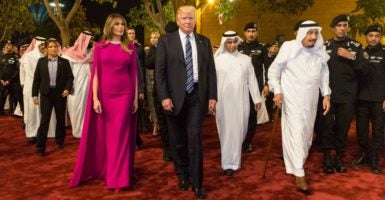Near the birthplace of Islam, President Donald Trump called for an alliance of Muslim-Arab nations to combat Islamic terrorism in his first major international address.
“Our goal is a coalition of nations who share the aim of stamping out extremism and providing our children a hopeful future that does honor to God,” Trump said in speaking to the Arab-Islamic-American Summit in Riyadh.
Trump, who spoke for about 35 minutes to more than 50 leaders of Muslim-majority countries, also announced many Middle Eastern countries were signing an agreement to prevent terrorism financing by establishing the Terrorist Financing Targeting Center, co-chaired by the United States and Saudi Arabia. Trump also participated in the opening of the Global Center for Combating Extremist Ideology in Riyadh.
Trump talked about the 9/11 attacks and the Boston bombing in the United States, and noted terrorist attacks across the world. He said some estimates show 95 percent of victims of terrorism are Muslims.
“In sheer numbers, the deadliest toll has been exacted on the innocent people of Arab, Muslim, and Middle Eastern nations,” Trump said. “They have borne the brunt of the killings and the worst of the destruction in this wave of fanatical violence.”
In a departure of sorts from both previous administrations, Trump struck a noninterventionist tone, asserting the U.S. does not want to “lecture” Middle Eastern countries, but he also called for the countries of the region to “take the lead” in fighting terrorism.
Trump didn’t use the term “radical Islam,” which he criticized the Obama administration for not using, but he clearly identified Islamic terrorism.
“There is still much work to be done. That means honestly confronting the crisis of Islamist extremism and the Islamists and the Islamic terror of all kinds. We must stop what they are doing to inspire, because they do nothing to inspire but kill, and we are having a very profound effect if you look at what has happened recently,” Trump said. “It means standing together against the murder of innocent Muslims, the oppression of women, the persecution of Jews, and the slaughter of Christians.”
Saudi Arabia was the first stop in Trump’s first international trip that will include a stop in Israel, at the Vatican in Rome—covering the three major religions of Islam, Judaism, and Christianity. Afterward, Trump will meet with European allies at Group of Seven and NATO gatherings.
Trump seemed to have a very cordial meeting with Saudi King Salman, and the two nations struck an arms deal. Before Trump spoke, Salman said his nation is committed to combating terrorism regardless of religion or sect. He also reiterated that Islam was a religion of peace and criticized Iran.
Great to be in Riyadh, Saudi Arabia. Looking forward to the afternoon and evening ahead. #POTUSAbroad pic.twitter.com/JJOra0KfyR
— Donald J. Trump (@realDonaldTrump) May 20, 2017
Trump also criticized Iran for providing “safe harbor, financial backing, social standing for recruitment.” President Barack Obama’s administration led a multilateral nuclear deal with Iranian regime, but during the speech, Trump called for peaceful nations to “isolate” Iran.
Trump talked about “principled realism,” seemingly referencing the strong interventionist policy of the previous Republican administration, which he criticized during his campaign.
“We are not here to lecture—we are not here to tell other people how to live, what to do, who to be, or how to worship. Instead, we are here to offer partnership—based on shared interests and values—to pursue a better future for us all,” Trump said.
“We will make decisions based on real-world outcomes—not inflexible ideology,” he continued. “We will be guided by the lessons of experience, not the confines of rigid thinking and, wherever possible, we will seek gradual reforms—not sudden intervention. We must seek partners, not perfection and to make allies of all who share our goals.”
But, the president stressed the Arab world must take ownership of the region, as he added:
Terrorism has spread across the world. But the path to peace begins right here, on this ancient soil, in this sacred land. America is prepared to stand with you—in pursuit of shared interests and common security … But the nations of the Middle East cannot wait for American power to crush this enemy for them. The nations of the Middle East will have to decide what kind of future they want for themselves, for their countries, and for their children.
I had a wonderful time with the students at the American International School #Riyadh today. #SaudiaArabia pic.twitter.com/AVzVV0W9Dm
— Melania Trump (@FLOTUS) May 21, 2017
Trump stressed the clash was not between faiths.
“Every time a terrorist murders an innocent person, and falsely invokes the name of God, it should be an insult to every person of faith,” Trump said.
He added it is a “battle between barbaric criminals who seek to obliterate human life, and decent people of all religions.”
“This is a battle between good and evil,” he added.
“Religious leaders must make this absolutely clear: Barbarism will deliver you no glory—piety to evil will bring you no dignity,” Trump said. “If you choose the path of terror, your life will be empty, your life will be brief, and your soul will be condemned.”
Trump also spoke about how driving out terrorist can restore the Middle East to greatness of its past.
The true toll of ISIS, if you look at what is happening, al-Qaeda, Hezbollah, Hamas, and so many others, must be counted not only in the number of dead, it also must be counted in the generations of vanished dreams. The Middle East is rich with natural beauty, lively cultures, and massive amounts of historic treasures. It should increasingly become one of the great global centers of commerce and opportunity. This region should not be a place from which refugees flee, but to which newcomers flock.
Editor’s Note: A quote from President Trump about a region and refugees has been corrected in this article.

































One Reply to “Trump Calls for Middle East to ‘Take the Lead’ in Fighting Terrorism”